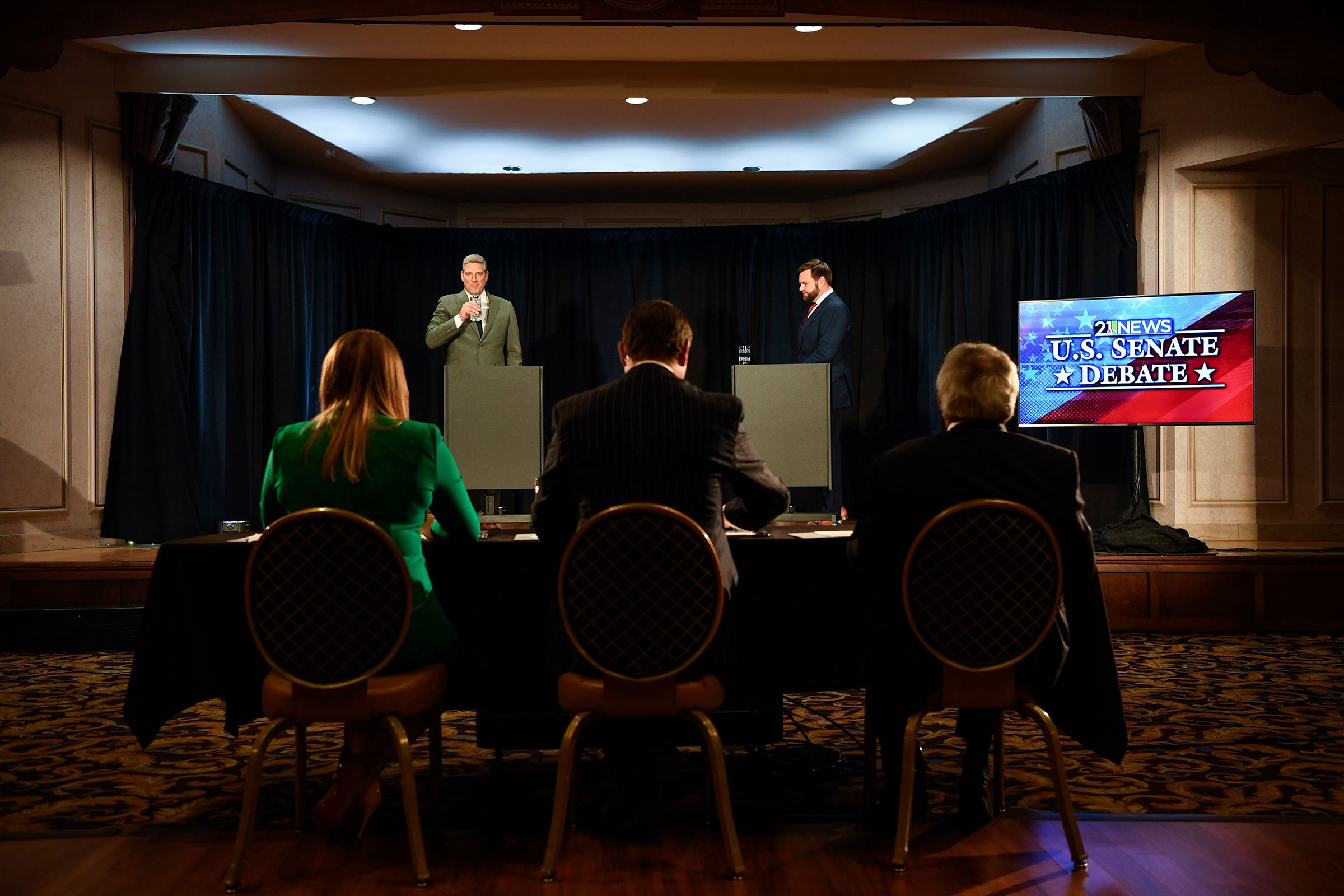
This article is part of The D.C. Brief, TIME’s politics newsletter. Sign up here to get stories like this sent to your inbox.
It’s never a good sign when, just two questions into a Senate debate, you have to pause the TV and rewind the clip to determine just whose ass one of the candidates was directing the other to kiss.
It turns out, Democratic Rep. Tim Ryan, talking over Republican J.D. Vance and a moderator trying to regain control of the debate, instructed Vance to kiss “his”—meaning former President Donald Trump’s—hind quarters. But given the timbre of the pair’s final scheduled debate from the start, it seemed just as plausible that Ryan had uttered “my” in a moment of disgust. And for the reporters watching carefully, more than a few had to review the DVR. (Right around the 13-minute mark on this recording.) Either was 100% possible, and it signaled a potential very new dynamic in the Senate come January.
With three weeks to go before Ohio picks a successor to mild-mannered dealmaker Rob Portman, the raucous debate in Youngstown Monday evening illustrated how fiercely both camps are taking the final push—and how little of the race in the once-prototypical swing state may hinge on the candidates themselves or even their issues. For much of the hour-long contemptuous meeting, Ryan and Vance were constantly invoking the boogeymen around their foe. For Vance, that meant bringing up Joe Biden and Nancy Pelosi, while Ryan kept linking Vance to Trump and libertarian billionaire Peter Thiel.
And, as has been the case for months, one candidate—Vance—effectively shrugged and said he liked his friends. The other—Ryan—launched into a sprint away from those perceived duds. Neither did well in concealing their mutual antipathy, or the fact that their fates may be sealed well beyond their headquarters. Polls show a tight contest, and both parties are slightly queasy about that.
“I really wish Tim Ryan had stood up to his party,” Vance said, launching an obvious ploy to cast the 20-year congressman as a Democratic rubber stamp.
Ryan responded with a white lie: “Look, it’s nothing personal. I’m just telling you, I’ve been in this business. It’s tough business,” he said. “If you can’t even stand up for yourself, how are you going to stand up for Ohio?”
Trump’s endorsement of Vance is seen as the turning point that handed the Hillbilly Elegy author the GOP nomination against far more-mainstream contenders, including an exec with the Cleveland Guardians who wanted to ditch the Trump era and a former state party chair whom Trump installed. But Vance struggled as the nominee, outsourcing parts of the campaign—read: money—to outside groups. If he’s to get across the finish line, Vance needs the MAGA red hats, which is why he and Trump recently shared a stage in Ryan’s political backyard of Youngstown despite plenty of gnashing if it was in Vance’s best interest at the moment.
Meanwhile, Ryan, a Clinton-styled Democrat, can’t get far enough from his party’s current establishment. He’s a Rust Belt populist who isn’t one to coddle the progressive wing of his party or to subscribe to its “woke” tendencies. In the final push toward Hillary Clinton’s electoral verdict in 2016, he went on-the-record with a Mahoning Valley veteran political journalist to speculate on a Cabinet role.
When I spent a few days with Ryan in our mutual childhood backyards in Northeast Ohio back in 2017 for a TIME cover story about the post-Hillary era, he was sounding the alarm that the Left was threatening to pull his party into the political wilderness; when he briefly ran for the White House two years later, he was still screaming it when we met up at a brewery on his first trip to Iowa as a declared candidate.
These days Ryan says Biden shouldn’t run in 2024, and has been pretty adamant that it’s time for his party to find a new generation of leadership. He is doing his best to keep Biden away from his political fortunes. Asked if he’d campaign with the President this fall, Ryan is unapologetically looking out for number one: “No. Uh-uh.”
Still, the money is flooding in to bolster his campaign, even if Democratic outside groups are staying away and Republican ones are owning the airwaves. As The Youngstown Vindicator’s David Skolnick notes, Ryan raised more money in the last three months than he did in 10 terms in the House. And pro-Vance groups have already spent $36 million to boost him, with that number poised to pass the $50 million mark without much more effort.
At the start of the debate on Monday, Ryan opened with a stinging moment, calling back to his unsuccessful bid challenging Pelosi for Speaker. “She was the top Democrat in the entire country, tough as nails. I stood toe to toe with her in a room full of 220 of my colleagues, with her sitting in the audience. I spoke my piece. Because when you’re from the Valley, that’s what you do. Then you shake their hands.”
And less than an hour later, Ryan demonstrated what he meant. After a bruising hour, he crossed the stage as the debate closed and clasped Vance’s hand. They shook, with plenty of rancor between them. But they ended a debate that was anything but cordial and set off for another three weeks to finish a hostile contest that is likely to be heavily swayed by those without ink on the ballot.
Make sense of what matters in Washington. Sign up for the D.C. Brief newsletter.
More Must-Reads from TIME
- Cybersecurity Experts Are Sounding the Alarm on DOGE
- Meet the 2025 Women of the Year
- The Harsh Truth About Disability Inclusion
- Why Do More Young Adults Have Cancer?
- Colman Domingo Leads With Radical Love
- How to Get Better at Doing Things Alone
- Michelle Zauner Stares Down the Darkness
Write to Philip Elliott at philip.elliott@time.com